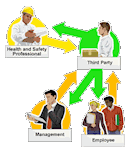Level 3, Health & Safety For Managers, CPD Award Winning Author
Advanced H&S management, 5 Steps to RA (INDG163), HSG65 and case law.
IBIS Training
Summary
- Certificate of completion - Free
Overview
Advanced management, 5 Steps to Risk Assessment (INDG163), HSG65 and case law to define principles including absolute, practicable, reasonably practicable and reasonable. Risk management including; COSHH, fire risk, hazards, control of contractors, accident management, legionella and gas service maintenance amongst other modules.
- Duty of Care
- Case Law
- Understanding Risk Assessment
- Control of Substances Hazardous to Health
- Driving and Workplace Transport
- Electrical Work
- Portable Appliance Testing
- Control of Contractors
- Manual Handling
- Noise
- Personal Protective Equipment
- Working at Height
- Accident and Incident
- Asbestos
- Fire and Emergency
- Legionella
- Gas Safety
- Health & Wellbeing
- Closing Summary
- CPD & Certificate of Completion
Course media
Description
This advanced Health & Safety management course provides an understanding of the Risk Assessment Process following the HSE's guide '5 Steps to Risk Assessment', and uses case law to define principles including; Absolute, Practicable, Reasonably Practicable and Reasonable.
Our course delves into the meaning behind the thinking of 'reasonably practicable' and looks at how the term 'reasonable man' is defined, and explores the significant differences in law and foreseeability. We look at "What is the Duty of Care, and who does it extend to?", Case Law is used to explain key principles such as an employer's duty of care cannot be delegated, individual duty of care and personal liability (criminal).
We also discuss vicarious liability and which sections of the 'Health & Safety at Work etc. Act 1974' are used to prosecute individuals, exploring in detail the powers of the enforcing authorities.
We also walk through accident management, communication and health & safety culture and identify vulnerability, disability and how they should be incorporated into the Risk Assessment process.
We talk about identification of initial risk and residual risk factors, and how calculations (although not compulsory) may be used to enhance your understanding and observation of priorities, while defining and explaining the Hierarchy of Control.
This course explores the common failures of risk assessments, and addresses the four fundamental ingredients to be considered; People, Equipment, Materials and the Environment.
In addition to the health and safety management principles, we take a closer look at common workplace hazards, and provide a greater detail of explanation concerning each subject.
For example, under Hazardous Substances, how Materials Safety data Sheets (MSDS), Long Term (LTEL) and Short Term (STEL) exposure limits are defined as well as the change between Occupational Exposure Limits (OEL) terms, ensuring an understanding of the common terms used in health and safety management today. We also cover explanation of the different types of sampling methods such as including grab, static and personal sampling techniques. This safety management training course, provided by IBIS Training based in London, is accessible at anytime online from an internet connected device, such as a computer, tablet or smart phone.
1. Duty of Care Understand the employers Duty of Care, using HSE legislation, key principles and and case precedents.
2. Case Law Learn about Case Law, understand what it is and how it can be useful.
3. Understanding Risk Assessment Learn the details of the Risk Assessment process while following the HSE's 5 Steps to Risk Assessment. Understand the key elements such as the PEME approach along with initial and residual risk factors using our realistic scenarios.
4. Control of Substances Hazardous to Health Understand the types of hazardous substances that may be found in the workplace, and their potential impacts upon health. Also provides an understanding about the types of hazard warning symbols and their meaning.
5. Driving and Workplace Transport Understand the potential harm of driving for work and how to take a proactive role in health and safety when driving.
6. Electrical Work Understand the dangers of disabling or bypassing safety features and safeguards on electrical equipment.
7. Portable Appliance Testing Understand why portable or moveable equipment may suffer additional wear, potentially causing harm to workers, we describe the factors which might contribute to this and actions to be taken by day-to-day workers and also by management such as user checks, formal visual examinations, and formal inspections/tests.
8. Control of Contractors Understand an employer's Duty of Care and obligations when engaging with contractors and learn about the 8 step plan for the Assessment of Competence of Contractors process.
9. Manual Handling Learn about the manual handling and movement of inanimate objects in the working environment and the techniques to use such as L.I.T.E.
10. Noise Understand how to avoid and control the cumulative effects of harmful levels of noise and where they might occur in the workplace.
11. Personal Protective Equipment Learn about PPE (Personal Protective Equipment) including safety helmets (i.e. hard hats), hearing protection, eye protection, hand protection, protective footwear, masks, respirators, clothing and overalls.
12. Working at Height Understand what working at height within the work environment actually means with examples to demonstrate suitable types of equipment and good practice.
13. Accident and Incident Understanding accidents, incidents, near miss events and the legal reporting requirements of RIDDOR (Reporting of Injuries, Diseases and Dangerous Occurrences Regulations).
14. Asbestos Familiarisation with key principles of the 3 types of asbestos, Chrysotile (White), Crocidolite (Blue), Amosite (Brown) and the harm it can do, why buildings have asbestos and how is it managed.
15. Fire and Emergency Understand the key principles of fire safety and how workplace fires can cause significant harm before reaching you. Learn about good housekeeping practices and other emergencies such as bomb threat and how they should be addressed in an emergency plan.
16. Legionella Understand legionnaires disease and the potential harmful impacts associated with the management of water systems in workplaces. Learn the sources of exposure for every-day workers, the effects on health, and how to control them.
17. Gas Safety Understand the importance of gas safety and the potential harm of inspections not being carried out effectively.
18. Health & Wellbeing Understand the importance of the personal health and wellbeing of yourself and those around you within the working environment.
19. Closing Summary A summary of the subject in a brief statement of key information with 'takeaway points'.Health & Safety For Managers Certificate All trainees receive a globally recognized & subject informative
Certificate of Completion as proof of successfully completing the training.
Who is this course for?
This course is perfect for individuals looking to improve their career worth with new or advancing skills and for all levels of management within a business or organization for an understanding of the managers obligations, liabilities and role in health and safety.
Requirements
Although this course is more advanced than our others and focused towards management level personnel and aspiring management level personnel, most all technical definitions are explained as well as the fundamental concepts, a basic level understanding of general working safety and health with good comprehension of the English language.
A working private email address, phone number and access to the internet with basic computer usage knowledge to access the course.
Career path
Our free/basic level 1 courses for a basic understanding of health and safety, through our level 2 courses for employees and professionals, progressing through our level 3 management courses and boardroom level courses for in-depth health and safety skills and incites.
Each of our courses provide a Certificate of Completion which improve your worth to employers & fast-tracking for higher roles.
Certificates
Certificate of completion
Digital certificate - Included
Reviews
Currently there are no reviews for this course. Be the first to leave a review.
Legal information
This course is advertised on reed.co.uk by the Course Provider, whose terms and conditions apply. Purchases are made directly from the Course Provider, and as such, content and materials are supplied by the Course Provider directly. Reed is acting as agent and not reseller in relation to this course. Reed's only responsibility is to facilitate your payment for the course. It is your responsibility to review and agree to the Course Provider's terms and conditions and satisfy yourself as to the suitability of the course you intend to purchase. Reed will not have any responsibility for the content of the course and/or associated materials.



